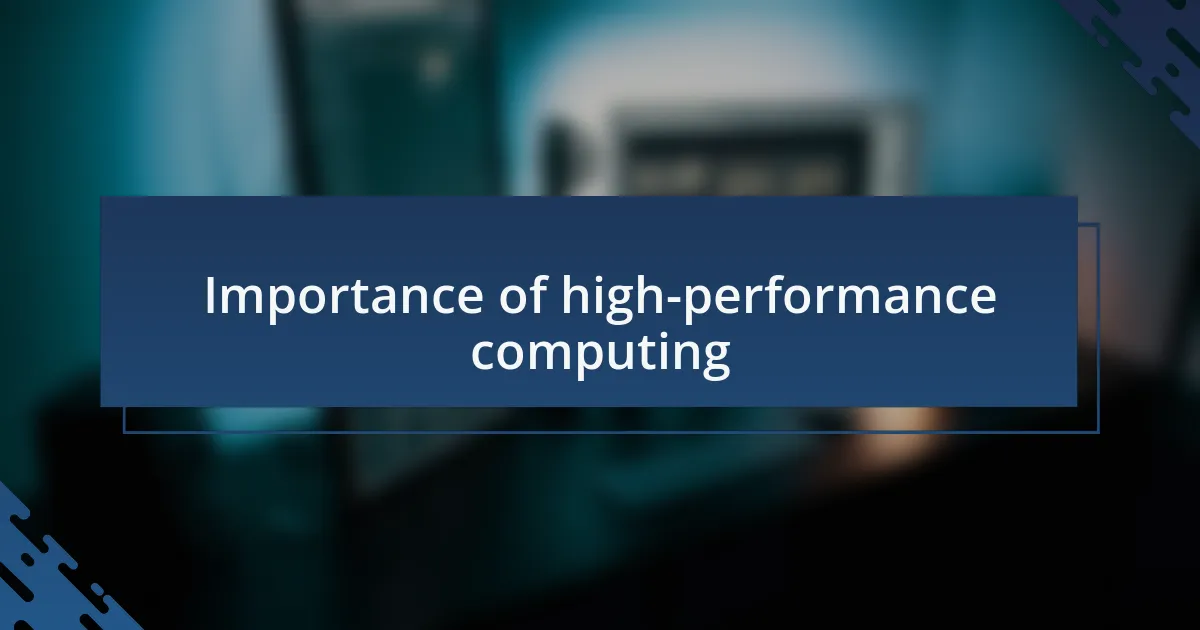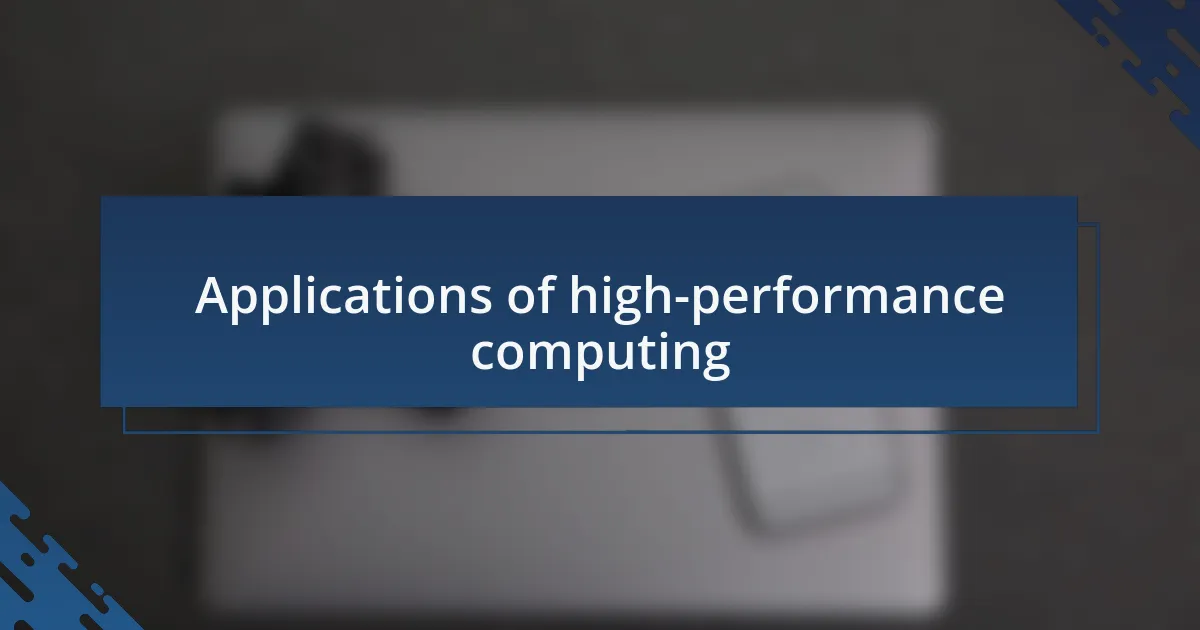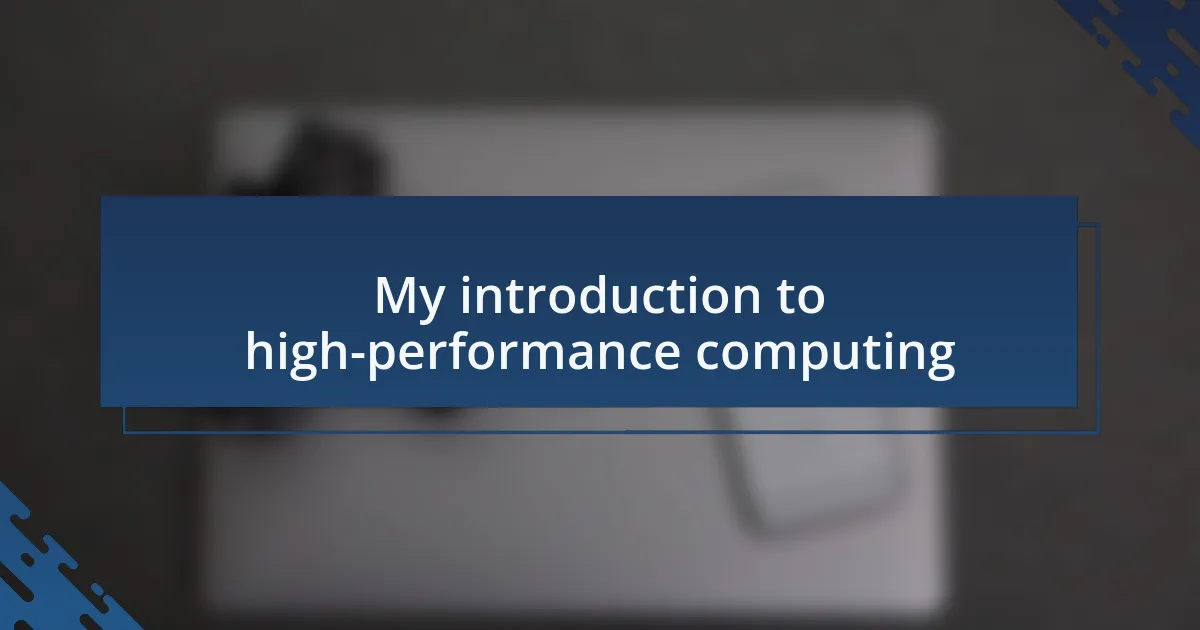Key takeaways:
- High-performance computing (HPC) uses supercomputers and parallel processing to solve complex problems efficiently, drastically reducing computation time.
- HPC is crucial across various fields, enabling real-time data analysis and fostering collaboration to address global challenges.
- Applications of HPC span healthcare (e.g., medical imaging), environmental science (climate modeling), and finance (risk assessment), significantly impacting decision-making and innovation.
- Key technologies in HPC include Apache Hadoop for big data, OpenMP for parallel tasks, and CUDA for GPU computing, which enhance computational capabilities and speed.

What is high-performance computing
High-performance computing (HPC) refers to the use of supercomputers and parallel processing techniques to solve complex computational problems. I remember the first time I encountered an HPC system; it felt like unlocking a treasure chest of computational power. Suddenly, tasks that would have taken days or weeks could be completed in hours or minutes.
In essence, HPC is about harnessing multiple processors working together to process data at astonishing speeds. Have you ever wondered how researchers manage to simulate climate models or analyze massive datasets? It’s this pooling of resources that allows for breakthroughs in science, medicine, and engineering that would otherwise be impossible with conventional computing.
The beauty of HPC lies in its ability to tackle immense challenges, leading to innovations and efficiencies that directly impact our lives. Reflecting on my experiences, it’s incredible to think how much information a supercomputer can crunch in a single run—just like solving complex puzzles at lightning speed. Isn’t it fascinating how technology continues to push the boundaries of what we can achieve?

Importance of high-performance computing
High-performance computing plays a critical role in diverse fields, entirely transforming how we approach research and development. I recall working on a project that required processing genomic data; without HPC, my efforts would have felt painstakingly slow and frustrating, merely scratching the surface of what was possible. The extraordinary ability to analyze vast amounts of data quickly enables researchers to make informed decisions and discover solutions in real-time.
The efficiency gained through HPC drives innovation in industries that impact our daily lives, from predicting weather systems to optimizing supply chains. I often think back to a time when I was part of a team predicting natural disasters; the rapid simulations allowed us to respond swiftly, potentially saving lives. Can you imagine navigating such complex scenarios without the computational power of high-performance systems? The stakes are incredibly high, and HPC equips us with the tools necessary to meet these challenges head-on.
Moreover, high-performance computing fosters collaboration across borders, uniting experts from various domains. In one of my projects, I had the opportunity to work alongside peers from different countries, sharing insights and resources in a way that was only possible because of HPC. It’s not just about number-crunching; it’s about building networks of knowledge that can tackle global challenges and drive progress. Have you ever experienced that exhilaration of being part of something larger than yourself, working collectively toward a common goal? That’s the essence of what HPC enables.

Applications of high-performance computing
High-performance computing has widened its horizons across various sectors, including healthcare, where data-intensive tasks like medical imaging and drug discovery are prominent. I remember collaborating on a project that utilized HPC to analyze MRI scans at an unprecedented speed. The ability to process these images in real time brought a sense of urgency and possibility; we were not just analyzing data, we were actively contributing to improved diagnostics and potentially life-saving treatments. It’s incredible to think about how scientists can now simulate the effects of new drugs before they ever reach clinical trials, streamlining the development process.
In environmental science, the capabilities of HPC play a pivotal role in climate modeling and ecological simulations. One of my most impactful experiences was working with a team that created climate models simulating decades of environmental changes. The sheer enormity of data we managed transformed our understanding of climate impact. When you consider how such simulations can influence policy decisions, it’s clear that HPC is an indispensable tool for fostering global sustainability. Can you envision a world where we can predict and mitigate the impacts of climate change more efficiently because of these powerful systems?
Additionally, the financial services sector has enthusiastically embraced HPC for risk assessment and high-frequency trading. I once participated in a project involving algorithmic trading, where milliseconds could mean the difference between profit and loss. The HPC environment allowed us to analyze market trends and execute trades with unmatched speed, leading to significant competitive advantages. It’s fascinating to reflect on how many transactions take place in a heartbeat; without the robust computational capabilities of HPC, we’d be left in the dust. How much do you think this technology influences the financial decisions made daily? It’s a game-changer, reshaping not just markets but the very foundations of financial operations.

My introduction to high-performance computing
It was during my undergraduate studies when I first encountered high-performance computing (HPC). I vividly remember stepping into the lab, the hum of powerful machines filling the air. My curiosity piqued as I attended a workshop that introduced us to the captivating world of parallel processing. Suddenly, I realized the vast potential of harnessing multiple processors to tackle complex problems faster than I had ever imagined.
As I delved deeper into HPC, I found myself working on a project that involved simulating fluid dynamics. The thrill of watching the simulations play out in real-time was exhilarating. I often found myself wondering, “How can such intricate calculations happen so quickly?” That experience ignited a passion within me for computational science, allowing me to appreciate how these advanced systems could solve problems across disciplines.
I recall a moment when my team successfully optimized our computations, and the results were not just immediate; they were transformative. The realization that we could simulate conditions that would typically take weeks in just hours was a watershed moment. It made me contemplate the broader implications of HPC: how many other fields could benefit from this technological leap? This personal journey laid a strong foundation for my ongoing fascination with high-performance computing, shaping my perspective on its limitless potential.

Tools and technologies I used
In my journey through high-performance computing, I relied heavily on tools like Apache Hadoop for big data processing and OpenMP for task parallelism. I remember the first time I set up a Hadoop cluster; it felt like assembling a puzzle where each piece had to fit perfectly to unlock insights from vast datasets. This experience deepened my understanding of distributed computing and how it empowers researchers to analyze mountains of data efficiently.
Another technology that played a crucial role in my projects was MATLAB, especially for algorithm development and mathematical modeling. The moment I discovered its ability to visualize data through intuitive plots, I felt like I had found a new language for expressing complex ideas. Have you ever stumbled upon a tool that just clicked for you? For me, MATLAB wasn’t just software; it was a window into understanding complex phenomena with clarity and precision.
I also ventured into GPU computing using CUDA, which was a game-changer for my simulations. The exhilaration I felt as I witnessed speed-ups in calculations that I thought were impossible is hard to describe. When I ran simulations that previously took hours, now completing in mere minutes, I couldn’t help but think about the opportunities this technology opened up for real-time applications. What if every scientist had access to such capabilities? That thought still excites me as I reflect on the transformative power of these tools.